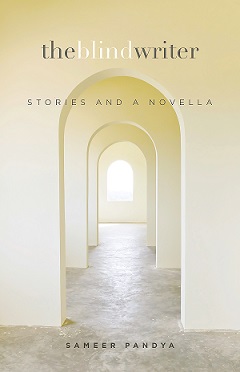 As a short story writer myself, I was thrilled at the opportunity to review a short story collection, and one which focuses on the Indian American experience, no less. Sameer Pandya’s The Bind Writer from the University of Hawaii Press (excerpted here) doesn’t disappoint with its array of immigrants from India with unique and idiosyncratic experiences, living life with generational gaps and gaffes in sunny California.
As a short story writer myself, I was thrilled at the opportunity to review a short story collection, and one which focuses on the Indian American experience, no less. Sameer Pandya’s The Bind Writer from the University of Hawaii Press (excerpted here) doesn’t disappoint with its array of immigrants from India with unique and idiosyncratic experiences, living life with generational gaps and gaffes in sunny California.
The book is a series of five stories anchored by a novella, and it turns out that the format is well suited to the topics Pandya chooses to raise here: loneliness, the need to succeed in both economic and social terms, the struggle that comes from leaving behind age-old customs and traditions and making our own way in a new world…as an immigrant I can identify with these oh, so well.
The surprising twist as I began reading was that the topic of immigrants is far from his consciousness, or rather from the consciousness of his characters. From the hyper-competitive mother of a spelling bee contestant to an inept lover who just can’t find the perfect woman, this collection is about people, not Indians. Take away the references to saris and Gujarati cuisine, and one could very well be reading about any American family, prison stints and all.
“He shows that the challenges faced by Indian American immigrants are no different than those faced by any other dysfunctional American family.”
That, then is the true appeal of Pandya’s collection. Appealing to a larger audience than just South Asians, he shows that the challenges faced by Indian American immigrants are no different than those faced by any other dysfunctional American family. In “M-o-t-h-e-r” we can identify with Uma’s crazy obsession with her son’s victory at the spelling bee, and somehow sympathize with her drastic measures to ensure winning. And which man hasn’t felt like Ajay in “Ajay the Lover”, struggling with self-imposed high standards that make accepting perfectly good women consistently impossible?
Perhaps the richest character in the story is Mahesh, from “Welcome Back Mahesh”, who comes back from prison to find things more complicated than when he had left. In the backdrop of an Indian family running a restaurant and liquor store, Mahesh’s infraction and subsequent incarceration are so startling that they shatter stereotypical images of good Asian kids working hard to make a life on a new continent. Yet his recollections of how he grew up as first generation Indian American are infinitely well-portrayed. Pandya blew all my presumptions out the window with this particular story.
The finale of the collection is the novella The Blind Writer, a roller coaster of emotional baggage with its passive aggressive characters who form a decidedly intriguing love triangle. Told from the perspective of a struggling young writer, Pandya takes us through so much in such little time. I didn’t think I would like this last story but when I finished reading it, I sighed with happiness.
The Blind Writer collection is a must-read for those who want glimpses of the Indian American experience, filled with angst and ease, struggle and survival, success and loss.
* **
Saadia Faruqi is the author of Brick Walls: Tales of Hope & Courage from Pakistan. Visit her website or follow her on Twitter @saadiafaruqi.












